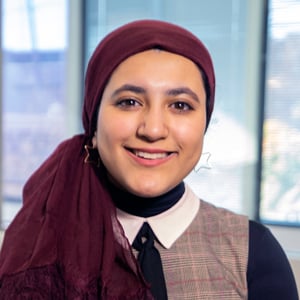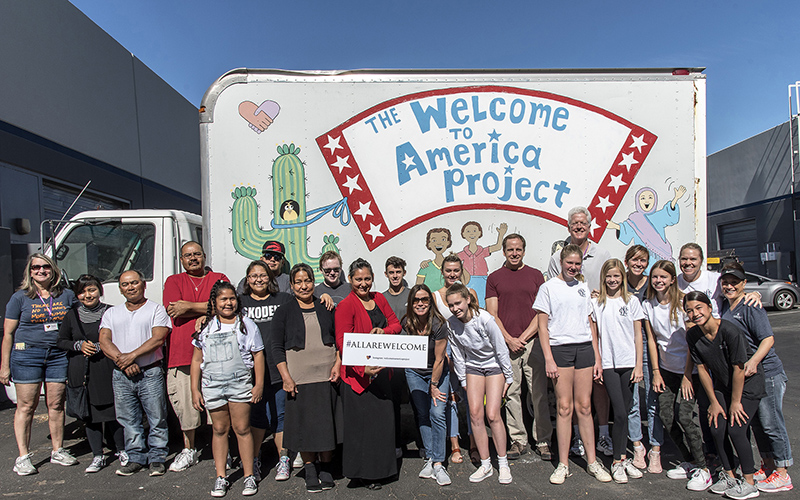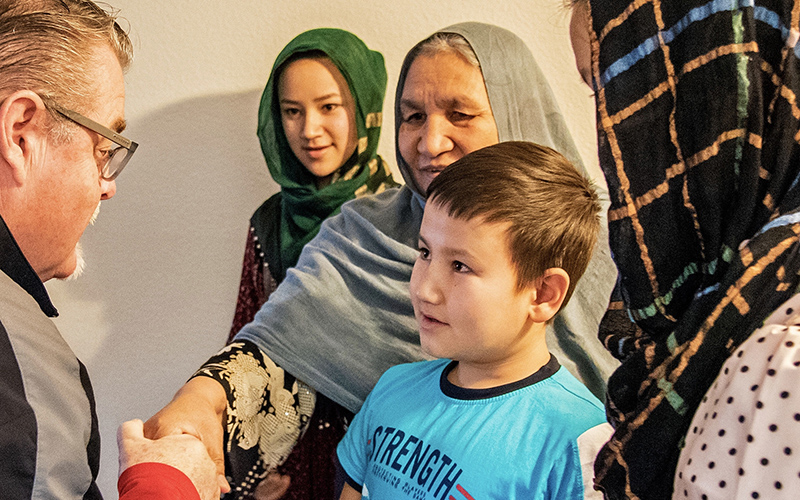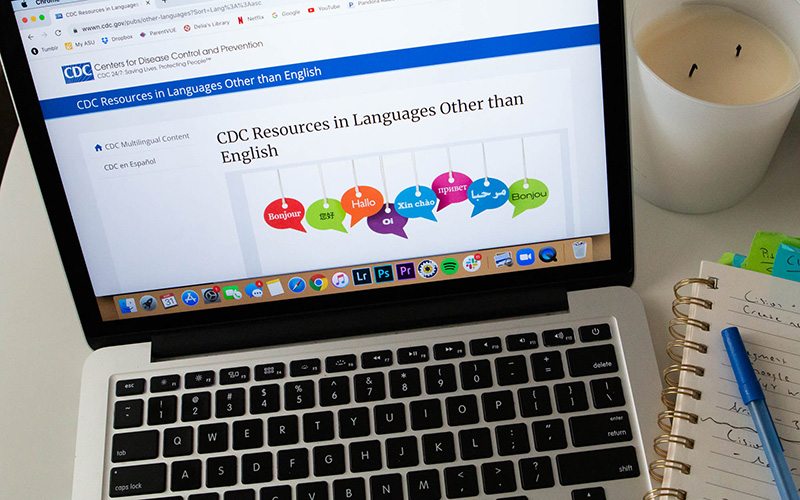PHOENIX – Sharing meals is generally frowned upon in the socially distanced, stay-at-home world of COVID-19, but one aid group is embracing the notion – figuratively, at least.
“Share a Meal With a Refugee,” a program run by the Welcome to America Project, collects donated gift cards to share with refugee families, a group that has been hit particularly hard by the effects of the coronavirus and its shutdowns.
“The goal is to get at least 200 gift cards and to share with families so that I could sit at home with my family and during the meal and say, ‘You know what, we’re having a meal with the refugee family tonight,'” said Mike Sullivan, the agency director for the Welcome to America Project.
It is just one of a growing number of programs by relief agencies that have stepped up to offer everything from gift cards to computers to crowdsourced fundraising to help refugee families grappling with COVID-19 in the Valley.
While COVID-19 has upended most lives, it has been particularly hard on refugees who are more likely to have jobs that put them at risk and less likely to qualify for unemployment if they lose those jobs. They also face challenges unimaginable to most Americans, like not having a computer at home for their children to get schooling and language barriers that prevent them from helping their kids with their studies.
“The jobs that they take are also often invisible jobs, meaning we’re in the front room dining in the restaurant, they’re in the back room making sure that the meals are prepared and that the utensils are cleaned,” Sullivan said.
And children in those families may already have been behind in school due to obstacles like language barriers, new education systems, different social settings and more. That is worrying to Rachel Fletcher, an Arizona State University senior who tutors refugee youth through a program called RISE – Refugee Integration, Stability and Education.
Fletcher has not been able to see her students because of the lockdown, and is increasingly worried about their educational growth.
“It’s a tremendous challenge because the support group (at school) is gone,” said Sullivan, pointing to the camaraderie students build in the classroom. “And now you’re at home with parents who may or may not speak English, and trying to learn on the computer with teachers that are less accessible to you.”
Despite the challenges, support from groups like Sullivan’s is as strong as ever – online and offline.
In addition to meal gift cards program, the Welcome to America Project is working closely with the nonprofit group PCs for Refugees to provide computers for refugee families.
A Glendale-based nonprofit, New Empowerment for Refugees, has been accepting gift cards in place of regular cash donations to pay for groceries or refugee families in the Valley.
Other groups have turned to crowdfunding. The International Rescue Committee of Phoenix raised $9,006 of its $10,000 goal in a month in a Gofundme COVID-19 emergency response fund. The Gofundme page said the funds will go to inform refugee families on the pandemic, for childcare costs and to help cover rent, utilities and other necessities for the next couple months.
Not all the assistance is financial. Mary Kaech, the director of Phoenix Refugee Connections, points to a Facebook page the group operates that connects resettlement agencies, volunteers, former refugees and people who just want to lend a hand.
“It’s more kind of mobilizing American people who are already here to go out and get to know their refugee neighbors and walk with them,” Kaech said of the page with almost 800 members.
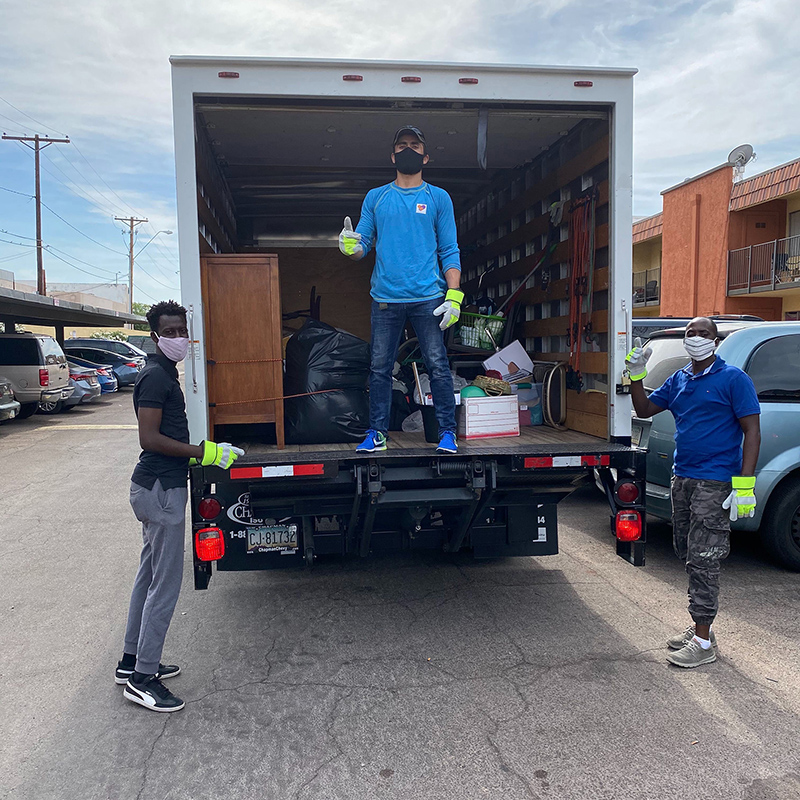
Volunteers for the Welcome to America Project deliver items to refugees from Eritrea and Congo earlier this month, when they also helped settle a young refugee in his first apartment. (Photo courtesy Mike Sullivan)
The page includes everything from job opportunities and educational resources to translation requests and fundraising efforts. Kaech said one post was able to raise $550 in COVID-19 relief donations in only a day.
Kaech said her organization is working now to educate refugees about the virus.
“There is a lot of information sharing to help people access resources whether it’s how to apply for unemployment benefits or how to get food from your child’s school, or how to stop the spread of germs,” she said.
Kaech pointed to videos produced by the Valleywise Health Medical Center in 10 languages, including Arabic, Somali, Karen, Burmese and Kirundi. They can help “people who don’t know how to read in their native languages,” and her organization is trying to spread the word on the videos and get “people in the network can share with their refugee friends.”
Phoenix Refugee Connections also regularly works to match resettled refugees with local leaders of their religions, as a way for them to find a new community in the United States and reach out for emotional or spiritual support as needed.
Nejra Sumic is the Arizona state refugee organizer for We Are All America, a coalition in nine states working to organize and build inclusive communities in America regardless of immigration status. Sumic, who advocates for refugee rights in Arizona, said that since April her group’s main effort has been launching a Gofundme with partners who aim to raise $300,000 to help refugees.
But Sumic said the assistance has not been a one-way street. “We’re also seeing a lot of refugees who are finding ways to contribute as well,” she said, pointing to some refugees she knows who are sewing cloth face masks while earning money to make up for lost sales when the virus forced their small businesses to close.
While their organizations have stepped forward, Sullivan said people don’t need to wait for a group to take the lead.
“You can be inspired by your own actions, you don’t have to wait to see somebody else do it,” Sullivan said.
